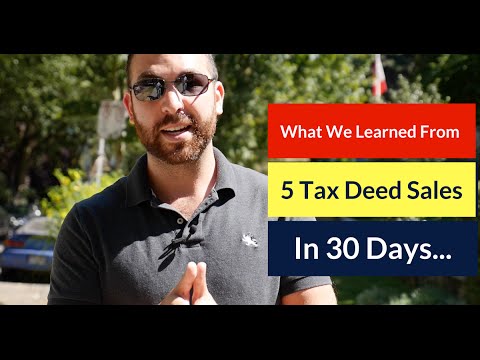Last Updated on October 23, 2025
Table of contents
Josh travelled to five tax deed auctions in four weeks. He drove more properties than ever before, placed dozens of bids and came home with valuable lessons. In this article, we’ll turn his video insights into an easy‑to‑read summary so you can follow his strategy for finding tax deed bargains.
1. Always do thorough due diligence
When Josh drove to his first property, the front looked fine. The lawn needed mowing, but the house seemed fixable. Then he walked around back and saw that the entire back wall was gone. In another sale in Philadelphia, a tree had grown through the back of the house. If he had stayed in his vehicle, he might have bought a house with no back wall or a tree inside it.
The lesson: get out of the car and inspect every side of the property. County treasurers warn that tax‑sale properties are sold “as is,” so bidders must research and inspect properties on their own. Josh’s due diligence now includes:
- Driving around all sides of the house to look for hidden damage or structural problems.
- Talking to neighbours, tenants and homeowners. In Florida, he met a neighbour and learned the homeowners’ association was being sued for not paying its water bills. Because the water was shut off, he passed on that deal.
- Checking with local officials or county records to confirm there are no outstanding liens or code violations.
For more ideas on what to look for during due diligence, read our guide on How to Pick Properties for Tax Deed Sales and the county treasurer’s warning that the buyer is responsible for researching each property
2. Attend multiple tax sales
Josh’s second tip is to branch out when one auction gets too competitive. He registered for an online auction in West Palm Beach, Florida. The day of the sale, he watched property after property sell for more than their after‑repair value. With so many out‑of‑state investors on their computers, prices were driven too high.
Instead of giving up, Josh opened a map and looked at other counties within a two‑hour drive. He found several counties holding monthly tax sales that required bidders to attend in person. These smaller auctions had fewer bidders, and he could buy properties at 20 to 50 cents on the dollar. Experts recommend attending more than one auction to learn local rules and widen your opportunities. Here’s how to follow Josh’s approach:
- Check neighbouring counties. Many counties hold monthly or quarterly auctions. Use county websites or search Bid4Assets and GovEase for dates and requirements.
- Look for offline sales. County treasurers often hold in‑person auctions with less competition than large online platforms.
- Stick to your maximum bid. Josh uses a “max bid sheet” so he doesn’t overpay. He avoids auctions where the bids rise above his maximum price.
If one auction seems too crowded, try a different county. You might be surprised by the deals available in less populated areas.
3. Know the land and rehab costs
Josh’s third lesson is about understanding local markets and rehab costs. Before bidding on a property, he calls contractors and realtors to learn what it really costs to repair a house. For example, he learned that a full rehab in Philadelphia costs about $55 per square foot, meaning a 1,000‑square‑foot house could require a $55,000 renovation. Knowing this helps him calculate his maximum bid and decide if the deal has enough profit.
To apply this tip:
- Call contractors on Craigslist or Angie’s List. Ask for quotes on roof repair, foundation repair and full rehab cost per square foot. Getting several quotes will give you a realistic estimate for labour and materials.
- Talk to local realtors. Realtors know which neighbourhoods are improving and which areas to avoid. Josh’s team learned from a realtor which parts of Philadelphia were worth investing in.
- Use free online tools. Sites like FEMA’s Flood Map Service Center help you check flood risk, while county GIS maps provide parcel data and zoning information.
More events and resources
Josh also announced some exciting opportunities for investors:
- Texas live event. We host monthly tax‑deed auction events in Houston where you can see our team in action and learn our strategies. Many of the people on our ground team started as students and now help others succeed.
- Philadelphia auctions. We attend auctions in Philadelphia every month and continue to find profitable deals.
Conclusion: Put these lessons into practice
Josh’s month of tax auctions boiled down to three simple, powerful lessons:
- Do thorough due diligence. Don’t just drive by; inspect all sides of the property and talk to neighbours to uncover hidden problems
- Attend multiple tax sales. When one auction is too crowded, look for smaller counties or offline sales. Experts recommend attending several auctions to gain experience
- Know the land and rehab costs. Call contractors and realtors to get accurate repair estimates and understand the local market
Frequently Asked Questions
Never rely on a drive-by. Always walk around the whole property, talk to neighbors, and check county records for hidden problems or liens.
Attend multiple sales, especially in smaller counties or in-person auctions. These often have fewer bidders and better deals.
Call local contractors to get per-square-foot quotes and ask about major repairs like roofs or foundations. Use these numbers to set your maximum bid.
It keeps you disciplined and prevents overpaying when auctions get emotional.
It keeps you disciplined and prevents overpaying when auctions get emotional.
Ready to take the next step? Check out our free mini course and resource on how to buy tax deeds at a discount. You can also book a free call with our team to get help with your first deal. Together, we’ll walk you through the process and help you find properties at 20–50 cents on the dollar. Get started by visiting our free resources page and scheduling your call today.






